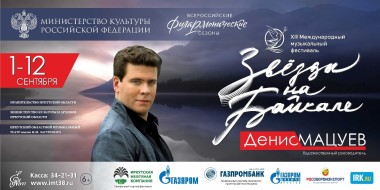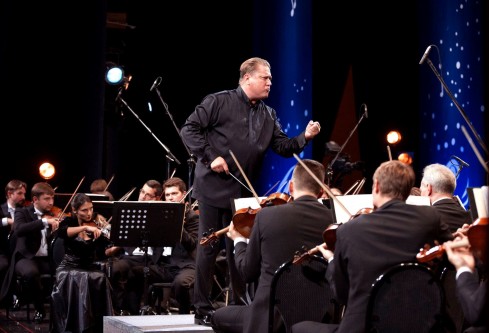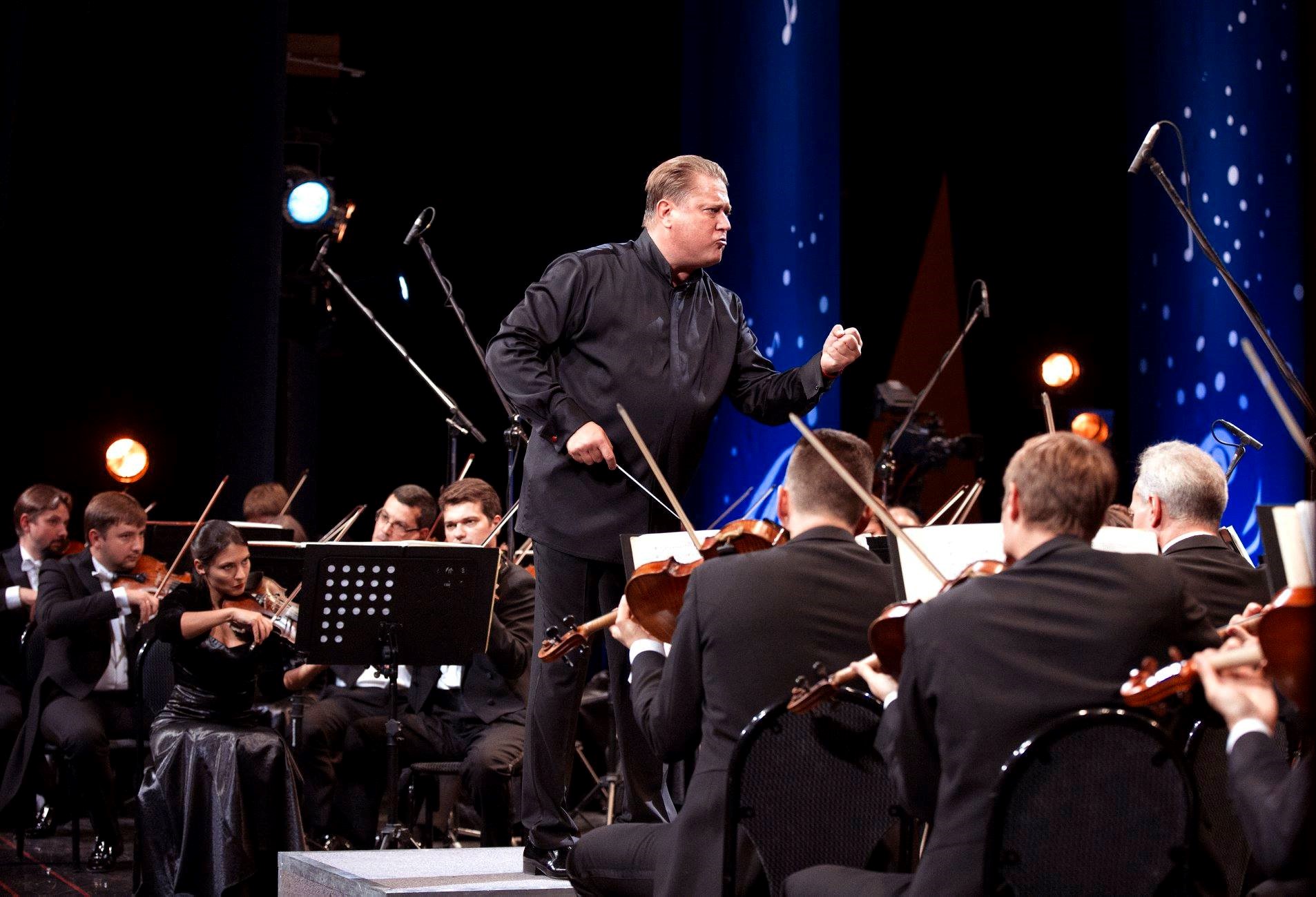
 Russian Federation ‘Stars on Baikal’ Festival [1] – Rachmaninov, Mendelssohn, Ibert, Tchaikovsky: Tatarstan National Symphony Orchestra / Alexander Sladkovsky (conductor), Alexander Malofeev (piano), Kristine Balanas (violin), Ekaterina Kornishina (flute), Zagursky Music Theatre, Irkutsk, 11.9.2018. (GT)
Russian Federation ‘Stars on Baikal’ Festival [1] – Rachmaninov, Mendelssohn, Ibert, Tchaikovsky: Tatarstan National Symphony Orchestra / Alexander Sladkovsky (conductor), Alexander Malofeev (piano), Kristine Balanas (violin), Ekaterina Kornishina (flute), Zagursky Music Theatre, Irkutsk, 11.9.2018. (GT)
Rachmaninov – Rhapsody on a Theme by Paganini
Mendelssohn – Violin Concerto in E minor
Ibert – Concerto for Flute
Tchaikovsky – Symphony No.5
The city of Irkutsk has been hosting the ‘Stars on Baikal’ for thirteen years now and with every passing year, more international guests are appearing in the Eastern Siberia city. The idea was the concept of Denis Matsuev who was born and educated here, and he has managed to attain major sponsorship from not only local government, but several companies from the energy sector. The Festival comprises both classical and jazz concerts, chamber and orchestral, and also take place in the town of Bratsk on the northern edge of the Baikal Lake. The opening concerts featured the Russian National Symphony Orchestra directed by Vladimir Spivakov, and several piano recitals unveiled Russia’s future piano generation. My first visit here was during the Soviet period, and the striking feature of the town are the diverse cultural groups who make up the population, walking through the main streets one comes across ethnic Chinese and Koreans, and other Asiatic groups from the far East, the Chukchis, all distinct in their features and often in their dress. The city was a place for those exiled both during the rule of the Romanovs and during the Soviet period; most famously the Decembrists who mounted the first revolt against the Romanovs in 1825. Owing to the city’s history, different peoples and cultures settled here, reflected by the numerous churches functioning in the city, temples, synagogues and catholic churches. The diverse architecture is also a source of interest and today Irkutsk attracts many tourists from both Russia, China and Korea. The Angara river which flows into the nearby Baikal (the world’s deepest fresh water lake) runs through the city. In 1986 Svyatoslav Richter in his famous six-month tour through Siberia gave a recital in one of the churches here, playing on his Yamaha piano which was hauled across Siberia with him. The venue for the Festival is the city’s Zagursky music theatre which has hosted light opera, ballet and other shows since 1941, has a capacity of over 1000 people and an agreeable acoustic. I should add that a tradition here is to take a dip in the freezing waters of the Baikal, a luxury I am glad to have abstained from!
In this, the first of two concerts by Sladkovsky’s Tatarstan musicians at this Irkutsk festival, we heard some of Russia’s brightest young talents in concert with this fine orchestra from Kazan. I had already was very impressed by the brilliant musicality of the sixteen year old Malofeev after his stunning performance of the Prokofiev Third Concerto two months ago in Provence, and here he tackled another popular yet difficult late romantic piece. I was not familiar with the Latvian violinist Balanas, nor with the flautist Kornishina, but they certainly reveal how wealthy is the current standards of Russian music teaching.

It was a couple of months ago that I first became familiar with the genius of Alexander Malofeev, if he astonished me with his Prokofiev Third Concerto in France, here he became the second performer of the Rhapsody on a Theme by Paganini in four days for me having heard it played by Trifonov in Moscow on Saturday afternoon (review click here). The latter was a once in a lifetime experience, and it would have been strange to expect anything like it, but in Malofeev, we truly have a future great pianist. Throughout he displayed wonderful fluency in tackling the difficult variations, each as the difficult as the other but each demanding artistry and poetry. The famous variations were brilliantly and sensitively performed, with Sladkovsky’s musicians providing sensitive backing to the young pianist. At the close, Malofeev gave an encore – the toccata from Prokofiev’s Seventh Piano Sonata, itself a tour de force!
The Latvian violinist Kristine Balanas is an exciting young prospect who is steadily building a major career and it was a coup certainly for her to appear here in Irkutsk, she has a beautiful tone from her 1787 Antonio Gragnani violin, and has a fearsome technique and allied by a dazzling musicality, Balanas gave a delicately nuanced reading of the Mendelssohn concerto, albeit in the opening movement, sometimes her playing revealed a hard tone, although in the slow movement, there was all the sweetness and harmony aided with notable support from the fine clarinets, flute, and oboes of the orchestra. Balanas is certainly one to look out for in years to come.
The flautist Ekaterina Kornishina is currently a student in Madrid and has already developed a career with Virtuosi Moscow and performed widely in Europe and the Far East. She has a fine musicality and brilliant technique and brought out all the colour and harmony of Ibert’s piece. Kornishina brought out all the southern colours in the elegiac impressionistic slow movement, but in the finale, all the sparkle of Ibert’s scoring was brilliantly evoked with sensitive accompaniment by Sladkovsky’s musicians.
The Tchaikovsky Fifth is perhaps the finest Russian romantic symphony, only matched by the ‘Pathétique’ in its tragedy and momentous scoring. Here to close the concert, the solemn opening on clarinets proved the appropriate beginning for this great work, followed by the treading idea on strings, and the second idea on woodwind, supported by the violins, and the build of passion slowly pushing the momentum before I was reminded of the glorious brass section with their magnificent playing. In the rerise of the exposition, Sladkovsky drew from his musicians superlative playing bringing out controlled emotion evincing all the fatalism of Tchaikovsky’s score. The conductor is particularly good to watch. Employing a broad expansive sweep of his arms, his gestures are clearly picked up by his orchestra.

The beautiful theme of fate on the horn of Sergey Antonov was masterfully done, I can’t remember when I have heard this so idiomatically characterised, evoking all the sad, wistful romance of the slow movement. There was particularly fine clarinet playing from Artur Mukhametshin picking up the doleful theme, and more from the oboe of Andrey Shubin and the sudden dramatic entry of the brass was terribly effective, before the slow dying away of the theme on clarinets and violins. With the scherzo, a different world arrived with the playful subject on the strings, and picked up on woodwind again. The dramatic opening of the Finale was thrillingly enacted by the mass strings with superb backing by the brass. Its always exciting to hear a top class orchestra playing their own music, and here Sladkovsky’s orchestra really showed world class musicality and brilliance in technique and artistry. Sometimes his orchestra are so well trained that he can afford to let them play without gestures for a few brief moments, this orchestra is so good, they know the score almost by heart. The Finale was enacted bringing out all the dark passion of Tchaikovsky’s Fifth Symphony in one of the finest interpretations I have heard for a long time. In response to the demands of the capacity audience, Sladkovsky gave five encores; The ‘Dance of the Tumblers’ from Tchaikovsky’s The Snowmaiden, Alexander Tchaikovsky’s Stan Tamerlane which proved just as stunning as the first time I heard it a couple of months ago, with all the dissonance of Prokofiev or Shostakovich, and the rhapsodic exoticism of Khachaturian, this brought the house down so much so Sladkovsky repeated it with many joining in the final chorus. Tremendous stuff!
Gregor Tassie
Photos: Yevgeni Yevtukhov
